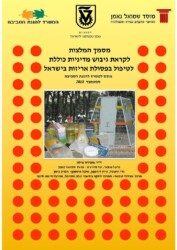Packaging represents, according to rough estimates, about 10-15% of the weight of municipal solid waste, and about one third of its volume. In economic terms, some $100-150 Million each year are spent over this fraction, without even taking into account the external effects of producing the packaging, collection, transport and waste treatment.
At the end of the 1990’s, the Ministry of the Environment considered introducing a packaging law in Israel, although it was eventually decided not to do so and that the management of packaging would be carried out in the context of overall solid waste management. However, in the intervening years, the law for bottle deposits was introduced in Israel (which created a logistical system for management of packaging) and in the western world we are facing many new additions and expansions of the packaging laws. In light of these developments, the S. Neaman Institute proposed to evaluate once again the subject, with the intention of evaluating the tools and systems that are most efficient to reduce the quantity and volume of packaging at the source.
The research involves collection of technical, economic and administrative data, mainly from Europe, which is a leader in this field, examination of alternatives for applying packaging law under Israeli economic conditions, and recommends a preferred option. According to the initial findings of the research, it was found that carrying out the packaging law is desirable and that introducing the law will promote the establishment of recycling industries in Israel, something which was not possible in the framework of the existing legislation (law of deposit for beverage bottles), due to economic infeasibility in establishing recycling industries and a logistical system of transport services of only one type of packaging (bottles). Moreover, successful implementation of the packaging law will lead to a significant reduction in waste disposal areas for municipal waste and savings to the national economy.





